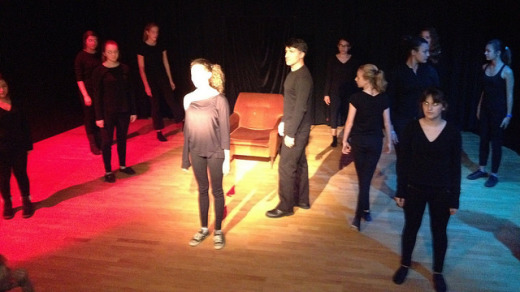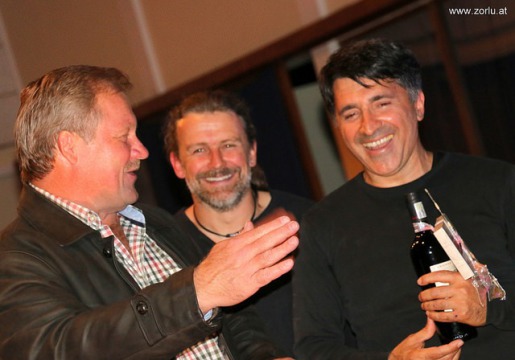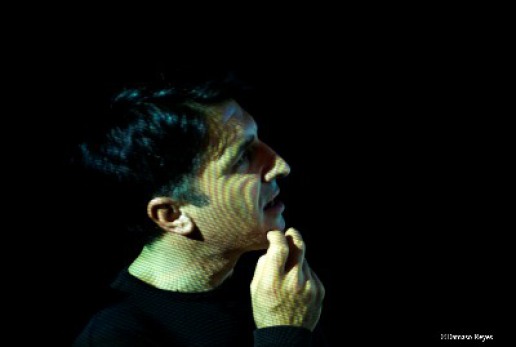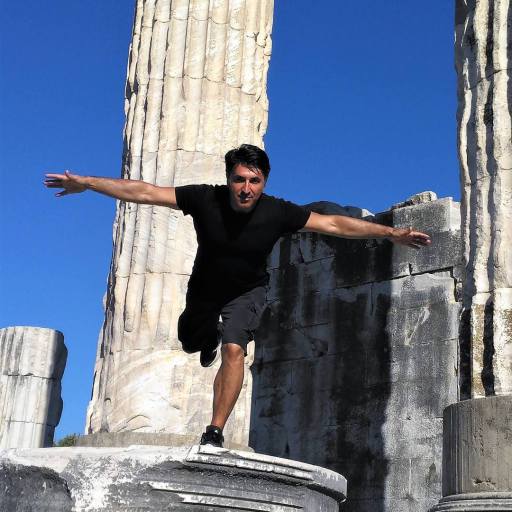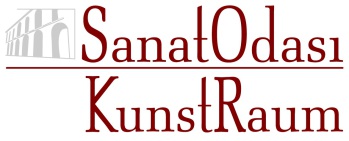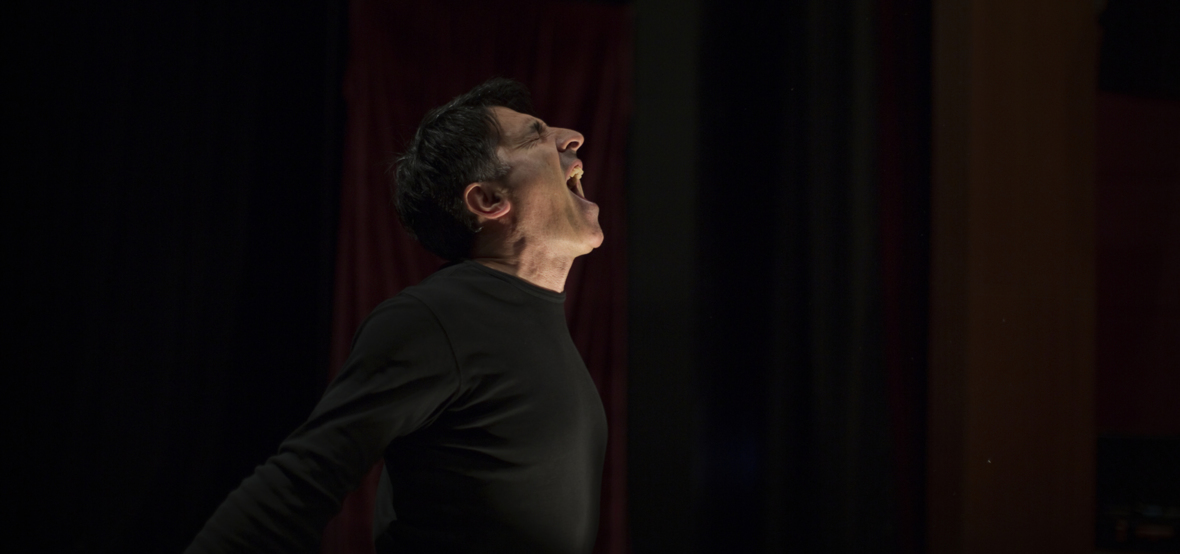
Cape Tawn 2015
"In his solo performance, German-Turkish stage actor Haydar Zorlu brought Johann Wolfgang von Goethe's “Faust” to the DSK on the 19th of May 2015. In the play, condensed into an engaging 80 minutes production, Zorlu invited the audience to probe the question of “what holds the world together” and captured his audience with every word and gesture starting with his first appearance on the stage. His novel interpretation of one of the greatest works of German literature and his incredible solo performance made this play well worth seeing.
He understood to seamlessly flow between the three different main characters: the narrator Dr. Faust, the devil Mephisto and Gretchen, an
innocent young woman. Zorlu focuses on mimicry art and styles of speaking during his performance. With language and animation, all the characters of this piece get their uniqueness. The actor was
supported by the students of the Grade 8 and 9 Drama Class, led by Mrs Engelhardt who met with Zorlu the previous day for an intensive theatre workshop. We would like to thank the German Embassy
in South Africa and the German Consulate in Cape Town for their friendly support and for bringing this extraordinary play to Cape Town." Jan Schumann http://www.dsk.co.za/home.html
Hermannsburg - South Afrika
Mr Stefan Zick, head of the German Department and the principal, Mr Martin Marx, thank Mr Haydar Zorlu for a stunning performance and for the time spent in workshops
with the Hermannsburg.
IT is not often that an actor of international stature - German Haydar Zorlu - star of seven films, 21 TV shows and seven theatre productions and a well-known figure in the world of German entertainment, comes across one’s path.
Mr Zorlu spent time on Friday and Saturday workshopping the German classic, Faust, with our Grade 11 and 12 pupils and on Saturday he performed his 80-minute adaptation of the tale with the help of our budding actors. The church hall was transformed into a cosy theatre, with the set and lighting to suit the ambience of the piece with the help of Mr Terry and Mr Kaiser. Our thanks go to Mr Zick from our German department and the German embassy who made Mr Zorlu’s visit possible.
Lynn Hitchcock >>
A Turkish-German Actor Bridges Europe and Asia,
by Damaso Reyes, Forbes >>
Unlike many actors or performers who need attention like a fish needs water, Haydar is more like a sunflower who basks in the light of
appreciation. He is neither neurotic nor obsessive but instead gives you the feeling that what you are saying is both important and interesting, even when you know it's not true.
Istanbul hosts ‘Don Juan’ and ‘Faust’
Istanbul’s first-ever Turkish and German theater hall, KunstRaum, presents two fictional legends of the modern-era history of European culture - the legends of Faust and Don Juan
Don Juan and Faust emerged before the French Revolution and bear certain similarities because they are both unable to control their desires. The two plays reveal the clash of ideas between Faust and
Don Juan, one of whose mission is to awaken desire and bring emotional and physical pleasure, while the other describes such needs as weakness and avoids them.
Don Juan
Don Juan, a wealthy libertine, goes to Rome with his servant Loperello and falls in love with Donna Anna, the daughter of Spanish ambassador Don Gonzalo. Although Donna Anna loves Don Juan, she gets
engaged with Duke Octavio, a member of an aristocrat family. Anna rejects Don Juan, as she believes love is temporary but fidelity lasts forever. Then everything becomes tumultuous.
In her review, sociologist Aslıhan Göktuğ said Turkish-German actor Haydar Zorlu's solo performance in "Faust" attracted a large audience, and this is why his next play "The Legend of Don Juan"
increased expectations for him. "I believe he exerted the same effort for this play, as he had previously devoted to "Faust" and paid particular attention to both," she continued. The review went on
to say Zorlu's interpretation is an influential version of "Don Juan," which has been staged in different languages around the world for many years. "I am proud to watch the Turkish version of the
play, a powerful step in the Turkish art scene. While you watch his interpretation, you will see that the "Legend of Don Juan" breaks the routine," she added. The play introduces a new perspective to
viewers by ignoring other play scripts based on mere repetition. Göktuğ underscores the innovative approach of Zorlu, who edited the original play without exceeding its borders. "If you find the
reflections of Don Juan's mysterious features in other characters, then you feel the need to review the existential philosophy that is generally described in a superficial way. I think Don Juan is a
rather influential character, at least for me, who is able to persuade people that he follows the right path," she said.
Leoporello: He cannot show his complaints to his master, which makes him behave in such an interesting way that viewers see the breaking point of the drama and begin to smile. Leoporello has another
desire, though, and reveals it with the following words, "Master, if it was possible, I would be like you!"
Donna Anna: Burcu Ertürk's performance beautifully reflects the deep love of Donna Anna to viewers. A nice atmosphere surrounds the stage while she is dancing with Don Juan. A must-see visual feast
of rich body language and love...
Duke Octavio: While Don Juan shows the most passionate form of love, Duke Octavio is such a reliable man that any woman can give herself to him without blinking an eye. Duke Octavio has loved Donna
Anna since his childhood and is excitedly waiting for the wedding day. He also has everything to win the heart of Anna's father.
Faust
Zorlu stages Goethe's masterpiece work "Faust" as a solo performance in either Turkish or German and sometimes in both languages. The tragic play drew incredible interest and attention when it was
first staged at KunstRaum. Doctor Faust believes that there is nothing left that he can learn and sells his soul to Mephisto, the devil, to recover from agony bound by life on earth. Mephisto
promises to treat his illness. A witch gives Faust an elixir that makes him young again. Transforming into a good-looking man, Faust falls in love with a beautiful girl named Gretchen. She is unable
to escape from Faust's deep passion for her.
Famous historian İlber Ortaylı's comments about the play on KunstRaum's website support the success of its Turkish version. "I watched Haydar Zorlu at Muammer Karaca Theater on Jun. 26. He adopted
Goethe's famous work "Faust" into an 80-minute play and adapted it into Turkish by himself. He rendered the introductory tirade in German to catch the musical effect in Goethe's poem. There is no
need to understand the whole text, but you must pay attention to the master musicality in Goethe's original language," he said.
Zorlu was raised in Germany and speaks German very well. Ortaylı stated Zorlu's Turkish performance also showed his other specialization. "It was pleasing to see a full theater hall and great
interest in Goethe and classical theater. Born in Turkey's eastern region, Zorlu studied linguistics and theater in Germany. "His successful theatrical performance is highly commendable," he
concluded. http://www.dailysabah.com/cinema/2015/01/03/istanbul-hosts-don-juan-and-faust
‘Faust' visits Bosphorus in Haydar Zorlu's solo performance
by Rebecca Wetzel >>
For almost four years now, stage actor Haydar Zorlu has been traveling between Germany and İstanbul for his novel interpretation of one of
the theater world repertoire's most demanding texts. In his solo performance, Zorlu brings Johann Wolfgang von Goethe's “Faust” back to people's minds. In the play, condensed into an engaging 80
minutes, Zorlu invites the audience to follow the question of what is sticking the whole world together and captures his audience with every word and gesture starting with his first appearance on the
stage.
The props are simple -- an old red armchair in the middle of the stage, a white synthetic wall covered in black drapery, a glass of water and very little light. Zorlu admits it
wasn't easy feat, but it quickly became a striking success. Zorlu focuses on mimicry art and styles of speaking during his performance. With language and animation, all the characters of this piece
get their uniqueness. And he plays them all with versatility: the narrator, Faust, Mephisto, Gretchen, her female neighbor, Valentin and even God at the end.
Although it is apparent that Zorlu enjoys playing all characters, Mephisto is especially performed in an expressive way. Seductive, over-officious, excited and destructive, Mephisto commits to
the desperate Faust as an attendant in this mortal world to fulfill his wishes. In return, Faust delivers his soul to the devil.
The play seems to be a capturing dance. During the performance, Zorlu uses all the ranges and depth the stage has to offer -- fitting the emotional content. Stage director Natalia Murariu helped with
the staging of “Faust.” “She ensured that the audience remains focused in spite of the difficult text by explicit movements,” said Zorlu in an interview last week with Sunday's Zaman. “In this way, I
keep on surprising my audience with the act of my body.”
Zorlu's interpretation of “Faust” is based on the promptness of the moment. “Nobody knows what is happening next although somebody surely knows the content,” said the actor. Every look on his face,
twist of his head or movement of his fingers has a deep meaning and even a crucial question becomes a little dance between Faust and Gretchen.
Zorlu says he's impressed with the story because of the character of Faust, who wants to know everything but has to admit that he doesn't know anything. The actor was planning to perform the play in
both German and Turkish from the first day he decided to embark on this project. “As a German-Turkish person, it was apparent for me to do the play in both languages.”
Faust' with a modern tone
Zorlu performed his German interpretation of “Faust” for the first time in front of journalists in Oberhausen in Germany. The play's premiere was in 2009 in the imperial hall of the German Consulate
General in İstanbul. One year later, he also started performing the Turkish version. Although “Faust” has been translated into numerous languages, Zorlu made his own Turkish translation. It took him
four years to get the final version of the text he performs now. “The challenge of the translation into Turkish was the lack of rhyme that exists in the original. Nevertheless, there needs to be a
tone in the performance. So I had to translate it like music,” says Zorlu.
In doing so, it was important to keep a modern language. Although the piece is popular in Turkey, it hasn't been performed on the stage for decades. “Nevertheless, ‘Faust' is mainstream. If it works
in Germany, why shouldn't it work in Turkey?”
And there was a good response from the audience and the media from the beginning. One of the main points critics highlighted was the comprehensibility the piece gained in the hands of Zorlu.
Now, Zorlu's “Faust” is performed about 40 times a year in Turkish and German theaters. The play requires a lot of organization. The actor sometimes travels between İstanbul and Germany several
times. Before he started with his solo performance in 2009, Zorlu was a successful actor in German films and TV series. And yet he recognized that he should start acting in theater again -- which was
the main reason why he became an actor.
Zorlu's “Faust” changes from time to time: sometimes he redesigns some details of his performance or stresses different parts of the text. Still it's essential for the actor to keep his performance
based on Goethe's original work. Both the German and the Turkish versions have become a success. Although the Goethe-Institut in İstanbul did not support his performance, he and his “Faust” are now
well-known in İstanbul.
One culture, two languages
Zorlu is both German and Turkish. He was born in a village of the eastern province of Bingöl in Turkey but moved to Germany after he finished primary school. He perceives a lot of commonalities
between Germany and Turkey. For him, the cultures are almost similar with the difference of their languages. Although his performance supports integration, he doesn't want the performance to be
restricted in an integrative purpose. Nevertheless, it brings about a lot of respect for the other language in the audience and helps them to overcome linguistic prejudices: “For example, the Germans
have the impression that the letter ü is dominant in the Turkish language or the other way round, [Turks have the impression] that the German language doesn't have a beautiful tone.”
“People speak about prejudices which they have no idea about,” says the 46-year-old actor.
In his Turkish “Faust,” Zorlu integrates three short excerpts from the German text: the salutation of Goethe and several sentences from Gretchen and Mephisto. “While Gretchen is deliriously
fantasizing in the dungeon for the salvation of her soul, the audience doesn't have to understand every word she says. Her desperation becomes clear through the sound of her words,” explains
Zorlu.
With the German sentences within the Turkish performance, he also intended to present the beautiful sound of German rhymes. And it works: although the majority of the audience don't understand those
words, they all keep quiet and attentive during those two minutes. During his bilingual performance, Zorlu starts playing in one language and switches to the other effortlessly, without disrupting
the story.
Now, as a future project, Zorlu is thinking of performing “Faust” in English as well.
And he has already started translating the text into English -- again by himself. “That opens a new territory -- the language -- that includes almost the whole world, and this way I could play it
much more often. As long as I'm not bored, I'll go on performing ‘Faust',” he says.

